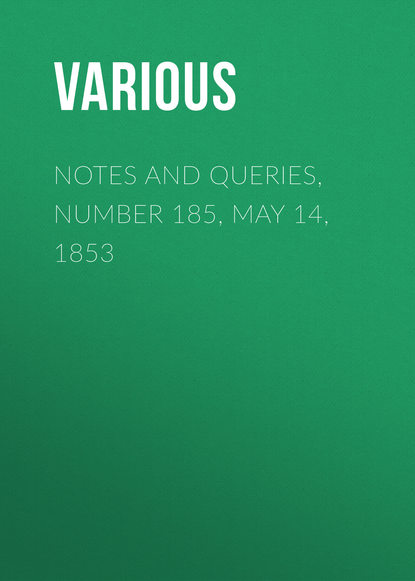По всем вопросам обращайтесь на: info@litportal.ru
(©) 2003-2024.
✖
Notes and Queries, Number 185, May 14, 1853
Автор
Год написания книги
2019
Настройки чтения
Размер шрифта
Высота строк
Поля
2. A Few Words for May-Day.
3. The Love of Horrors.
4. Layard's Last Discoveries.
5. Railway Literature.
6. The Old Royal Palaces at Oxford.
7. The Poultry Mania.
8. Public Libraries.
9. Slavery in America.
10. Social Life in Paris.
JOHN HENRY PARKER 377. Strand; and of all Booksellers and Railway stations.
ROYAL ASYLUM OF ST. ANN'S SOCIETY.—Waiting not for the Child of those once in prosperity to become an Orphan, but by Voluntary Contributions affording at once a Home, Clothing, Maintenance, and Education.
The Half-yearly Election will take place at the London Tavern on Friday, August l2th, next.
Forms of Nomination may be procured at the Office, where Subscriptions will be thankfully received.
Executors of Benefactors by Will become Life Governors according to the amount of the Bequest.
E. F. LEEKS, Secretary.
2. Charlotte Row, Mansion House.
notes
1
We must exempt from this sweeping assertion a very interesting and well-written account of works on this subject, entitled "A Sketch of that Branch of Literature called Books of Emblems, as it flourished during the 16th and 17th centuries, by Joseph Brooks Yates, Esq., F.S.A.," of West Dingle, near Liverpool, the friend of Roscoe, and the worthy and intelligent President of the Literary and Philosophical Society of Liverpool, read at their meetings, and of which two parts have already been printed in their volumes of Proceedings. This "Sketch" only requires to be enlarged and completed, with specimens added of the different styles of the engravings, to render it everything that is to be desired on the subject.
2
Perhaps this, and the works of Colman and Heywood, are scarcely to be considered as Books of Emblems.
3
[For some account of this work, by Arthur Bury, and the controversy respecting it, see Wood's Athenæ, edit. Bliss, vol. i. p. 483. William Rooke, the Writer of the letter, was of Queen's College; made B.A., May 16, 1674; M.A., Oct. 30, 1677; B.D., April 12, 1690.—Ed.]
4
Robertus Bloëtus also, who was still Bishop of Lincoln, and Rogerus, Bishop of Salisbury, appear to have had sons, though, perhaps, not born in wedlock; but query.
3. The Love of Horrors.
4. Layard's Last Discoveries.
5. Railway Literature.
6. The Old Royal Palaces at Oxford.
7. The Poultry Mania.
8. Public Libraries.
9. Slavery in America.
10. Social Life in Paris.
JOHN HENRY PARKER 377. Strand; and of all Booksellers and Railway stations.
ROYAL ASYLUM OF ST. ANN'S SOCIETY.—Waiting not for the Child of those once in prosperity to become an Orphan, but by Voluntary Contributions affording at once a Home, Clothing, Maintenance, and Education.
The Half-yearly Election will take place at the London Tavern on Friday, August l2th, next.
Forms of Nomination may be procured at the Office, where Subscriptions will be thankfully received.
Executors of Benefactors by Will become Life Governors according to the amount of the Bequest.
E. F. LEEKS, Secretary.
2. Charlotte Row, Mansion House.
notes
1
We must exempt from this sweeping assertion a very interesting and well-written account of works on this subject, entitled "A Sketch of that Branch of Literature called Books of Emblems, as it flourished during the 16th and 17th centuries, by Joseph Brooks Yates, Esq., F.S.A.," of West Dingle, near Liverpool, the friend of Roscoe, and the worthy and intelligent President of the Literary and Philosophical Society of Liverpool, read at their meetings, and of which two parts have already been printed in their volumes of Proceedings. This "Sketch" only requires to be enlarged and completed, with specimens added of the different styles of the engravings, to render it everything that is to be desired on the subject.
2
Perhaps this, and the works of Colman and Heywood, are scarcely to be considered as Books of Emblems.
3
[For some account of this work, by Arthur Bury, and the controversy respecting it, see Wood's Athenæ, edit. Bliss, vol. i. p. 483. William Rooke, the Writer of the letter, was of Queen's College; made B.A., May 16, 1674; M.A., Oct. 30, 1677; B.D., April 12, 1690.—Ed.]
4
Robertus Bloëtus also, who was still Bishop of Lincoln, and Rogerus, Bishop of Salisbury, appear to have had sons, though, perhaps, not born in wedlock; but query.











